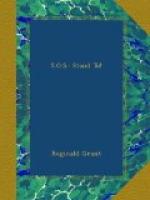For turkey we had a French pig purchased from a farmer for 300 francs, each man chipping in three francs; new carrots, Irish potatoes, boiled onions, cranberry sauce, the latter supplied by a large-hearted French lady in the town, made up the accompaniment of the “Turkey.” For dessert we had a speech from Major Wright, congratulating us on our work in the Somme. In a few well-chosen words he told us how we had lost over 60 per cent of our men, counting the reinforcements, and that it was a matter of sincere gratitude to every man of us that we were there to enjoy the bounteous Christmas cheer.
CHAPTER XVI
BEFORE VIMY
In the course of ten days we arrived at Bully-Grenay, situated in the very heart of the mining district, three mines being located in the town itself. We were still working on the Vimy Ridge proposition. At no time in France were our quarters more comfortable than here; each gun of my battery was stationed in the cellar of a private house on the outskirts of the town from which the civilians had been shelled, and at night in the midst of a game of cards, or engaged in our letter writing, or reading, when we got the “S.O.S.” signal, the lanyard was at my hand and I had only to pull the rope. Our quarters were heated by coal purchased direct from the mine and furnished to us at ten cents per bag. Every mine in this place was worked only at night, the smoke of the industry indicating to Fritz where to plant his shells; therefore, the entire coal mining was done during the hours of sleep.
The Huns were making a most determined effort to get possession of Bully-Grenay and these most valuable coal mines, and they were anxiously looking forward to the time when they could attack successfully, and knowing how vital to us it was to get out this coal, they concentrated their efforts through the daytime on the mine shafts in an effort to destroy them; but having no smoke signals to guide their fire, their efforts generally were futile.
A notable instance of the spirit controlling our ideas of warfare was splendidly illustrated in this particular sector. Among the captured French mines that the Germans were working was one in close proximity to a church, of whose existence they took particular pains to let us know; and the church, in addition to being used as a protection for the mine, was also used as a camouflage for one of their batteries, the guns being placed immediately in front of it. It is repugnant to the very soul of a British soldier to level his gun at a church, so Fritz was able to get away with his camouflage.




